Nestled up on the eighth floor and without any sign to indicate its existence to passersby on the street, the Jazz Record Shop is certainly not easy to find. But Fred Cohen’s collection of music and memorabilia has a cult of clientele who come from around the world to see it with their own eyes. During my visit, Fred’s wife, Bobbie, helped customers navigate the CDs, DVDs, posters, books, and records while he led me to a quiet corner for our “heart to heart. ”While growing up in Boston (Dorchester, West Roxbury, then Jamaica Plain), music was a peripheral part of Fred’s life. “My mother had a lovely voice, she sang in a chorus in Pittsburgh and there were records of show-tunes around the house, ” he reminisced. “We did have a piano but my sister was always the pianist. It wasn’t until my aunt took me to the Boston Jazz Festival that I was exposed to music that really blew me away. ”Still, Fred never expected that jazz would become his life’s passion. After college, he took a job with Odyssey House in New York as a drug rehabilitation counselor. “This was 1969 through 1982, and after eleven years I was burned out. I didn’t know what to do. I figured I could live for a year off of my savings, and it helped that Bobbie was making good money as a textile designer at the time. That’s when I got the call from Jolly Roger. ”Jolly Roger was a jazz record store on Columbus Avenue that Fred often frequented. The owner was looking for a new person to take over the business and offered the opportunity to Fred. “I really didn’t think it was a good idea, ” he recalled. “In my previous job, I was traveling to conferences and centers across the United States. The idea of sitting at a desk waiting on people - that did not sound like me. But Bobbie said we should at least take a look. The shop was incredibly narrow, like a railroad flat, and you could barely turn around with all the record racks in there. ” Fred paused a moment and shook his head before picking up the story once more. “But at the back there was this window and you could see this tree. And on this tree were two crooning morning doves. Bobbie took it as a sign. We opened on April 1st 1983, moved to the West 26th location in 1992, and, well, we are still here today. ” As the years went by, Fred broadened his musical interests, schmoozed with fellow collectors, and listened carefully to his customers. Today, Fred is the one who does most of the teaching, and by all accounts he is an expert in identifying and appraising jazz memorabilia. He literally wrote the book on collecting Blue Note records to help fellow enthusiasts identify original pressings. And it turns out, according to Fred, that sitting behind a desk is not so bad. “Selling CDs is a boring experience but LPs are a different story. Each one has such a vast technical, social, musical, and cultural history that I could spend a day talking about each aspect. ” Fred led me over to a closet called the “vault” to show me some of his personal items that are not for sale. Perhaps the most impressive was a Charlie Parker LP “Bird Blows the Blues” that Dial records offered exclusively via a mail-in order coupon in the June 3, 1949 issue of Downbeat Magazine. Fred has not only the record (of which only about fifty were sold), but the magazine issue and the coupon, too. When I inquired about the value of the Charlie Parker material, he told me they are worth five to ten thousand dollars, but he doesn’t plan to part with them any time soon, if ever. To Fred they are priceless. Eventually, Fred and Bobbie plan to step away from their business. What that will mean for The Jazz Record Center, they are not sure. “To be honest, it’s a little scary to think about, ” Fred said. “I do want it to live on. In one form or another, I’d love for it to survive. ”





















